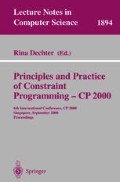Abstract
The constraint satisfaction problem provides a natural framework for expressing many combinatorial problems. Since the general problem is NP-hard, an important question is how to restrict the problem to ensure tractability. The concept of independence has proven to be a useful method for constructing tractable constraint classes from existing classes. Since checking the independence property may be a difficult task, we provide a simple method for checking this property. Our method builds on a somewhat surprising connection between independence and refinements which is a recently established way of reducing one constraint satisfaction problem to another. Refinements have two interesting properties: (1) they preserve consistency; and (2) their correctness can be easily checked by a computer-assisted analysis. We show that all previous independence results of the point algebra for totally ordered and partially ordered time can be derived using this method. We also employ the method for deriving new tractable classes.
This research has been supported by the ECSEL graduate student program.
This research has been supported by the Swedish Research Council for the Engineering Sciences (TFR) under grant 97-301.
This research has been supported by the Deutsche Forschungsgemeinschaft under grant Ne 623/1-2 which is part of the DFG priority program “Spatial Cognition”
Access this chapter
Tax calculation will be finalised at checkout
Purchases are for personal use only
Preview
Unable to display preview. Download preview PDF.
References
F. Anger, D. Mitra, and R. Rodriguez. Temporal constraint networks in nonlinear time. Technical report, ECAI Workshop on Temporal and Spatial Reasoning, 1998.
C. Bessière, A. Isli, and G. Ligozat. Global consistency in interval algebra networks: tractable subclasses. In W. Wahlster, editor, Proceedings of the 12th European Conference on Artificial Intelligence (ECAI-96), pages 3–7, Budapest, Hungary, Aug. 1996. Wiley.
M. Broxvall and P. Jonsson. Towards a complete classification of tractability in point algebras for nonlinear time. In Proceedings of the 5th International Conference on Principles and Practice of Constraint Programming (CP-99), pages 448–454, Alexandria, VA, USA, Oct. 1999.
M. Broxvall and P. Jonsson. Disjunctive temporal reasoning in partially ordered time structures. In Proceedings of the Seventeenth National Conference on Artificial Intelligence (AAAI-2000). AAAI Press, 2000. To appear.
D. Cohen, P. Jeavons, and M. Koubarakis. Tractable disjunctive constraints. In Proceedings of the 3rd International Conference on Principles and Practice for Constraint Programming, pages 478–490, 1997.
Y. Deville, O. Barette, and P. van Hentenryck. Constraint satisfaction over connected row convex constraints. Artificial Intelligence, 109(1–2):243–271, 1999.
E. C. Freuder. A sufficient condition for backtrack-bounded search. Journal of the ACM, 32:755–761, 1985.
G. Gottlob, N. Leone, and F. Scarcello. A comparison of structural CSP decomposition methods. In Proceedings of the 16th International Joint Conference on Artificial Intelligence (IJCAI-99), pages 394–399, Stockholm, Sweden, 1999.
P. G. Jeavons, D. Cohen and M. Gyssens. A test for tractability. In Proceedings of the 2nd International Conference on Principles and Practice for Constraint Programming, pages 267–281, 1996.
P. G. Jeavons and M. C. Cooper. Tractable constraints on ordered domains. Artificial Intelligence, 79:327–339, 1996.
P. Jonsson and T. Drakengren. A complete classification of tractability in RCC-5. Journal of Artificial Intelligence Research, 6:211–221, 1997.
A. K. Mackworth. Consistency in networks of relations. Artificial Intelligence, 8:99–118, 1977.
B. Nebel and H.-J. Bürckert. Reasoning about temporal relations: A maximal tractable subclass of Allen’s interval algebra. Journal of the ACM, 42(1):43–66, 1995.
David A. Randell, Zhan Cui, and Anthony G. Cohn. A spatial logic based on regions and connection. In B. Nebel, W. Swartout, and C. Rich, editors, Principles of Knowledge Representation and Reasoning: Proceedings of the 3rd International Conference, pages 165–176, Cambridge, MA, October 1992. Morgan Kaufmann.
J. Renz. Maximal tractable fragments of the Region Connection Calculus: A complete analysis. In Proceedings of the 16th International Joint Conference on Artificial Intelligence (IJCAI-99), pages 129–143, Stockholm, Sweden, 1999.
J. Renz and B. Nebel. On the complexity of qualitative spatial reasoning: A maximal tractable fragment of the Region Connection Calculus. Artificial Intelligence, 108(1–2):69–123, 1999.
P. van Beek and R. Dechter. On the minimality and decomposability of row-convex constraint networks. Journal of the ACM, 42:543–561, 1995.
M. B. Vilain, H. Kautz and P. van Beek. Constraint propagation algorithms for temporal reasoning: A revised report. In Readings in Qualitative Reasoning about Physical Systems, pages 373–381. Morgan Kaufmann, San Mateo, CA, 1989.
Author information
Authors and Affiliations
Editor information
Editors and Affiliations
Rights and permissions
Copyright information
© 2000 Springer-Verlag Berlin Heidelberg
About this paper
Cite this paper
Broxvall, M., Jonsson, P., Renz, J. (2000). Refinements and Independence: A Simple Method for Identifying Tractable Disjunctive Constraints. In: Dechter, R. (eds) Principles and Practice of Constraint Programming – CP 2000. CP 2000. Lecture Notes in Computer Science, vol 1894. Springer, Berlin, Heidelberg. https://doi.org/10.1007/3-540-45349-0_10
Download citation
DOI: https://doi.org/10.1007/3-540-45349-0_10
Published:
Publisher Name: Springer, Berlin, Heidelberg
Print ISBN: 978-3-540-41053-9
Online ISBN: 978-3-540-45349-9
eBook Packages: Springer Book Archive

